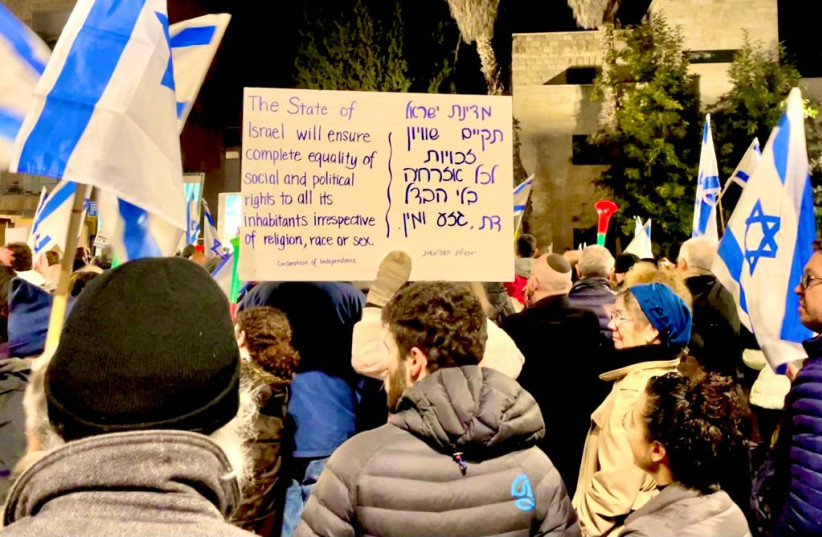It was a wake-up call, and a rather jolting one at that. Back in December, Abe Foxman, former head of the Anti-Defamation League and indisputably one of the Jewish state’s staunchest supporters, sounded the alarm. “I never thought that I would reach that point where I would say that my support of Israel is conditional,” he declared in an interview with The Jerusalem Post.
“I never thought that I would reach that point where I would say that my support of Israel is conditional.”
Abe Foxman
Foxman cited the judicial reform underway (whose opponents claim is tantamount to nothing short of regime change) proposed tampering with the Law of Return and Israel’s long-standing definition of who is a Jew; looming impingement on the rights of minorities, including the LGBTQ community; and other concomitant threats to Israel’s democracy. Should the current government prove successful in executing its declared agenda, he cautioned, Israel would lose his backing and that of 70% of world Jewry. Simply put, Foxman concluded, “If Israel ceases to be an open democracy, I won’t be able to support it.”
With President Isaac Herzog’s call for dialogue between the government and the opposition on these matters as yet unheeded, and the coalition’s insistence on bringing elements of its legal revolution to a vote this past Monday, without pausing for negotiation, it would appear that Israel has moved perilously closer to the sort of estrangement Foxman has warned of – disillusionment not only among the Jewish people abroad but also felt deeply by so many at home.
Even a stalwart supporter of the Right such as Ayelet Shaked warned in her final Knesset speech as interior minister that the incoming government was already alienating many Israelis, even to the point of causing them to consider leaving the country.

Just how close are we, then, to that watershed moment when the idea of forging Israel as a truly democratic and pluralistic Jewish state will be perceived as being beyond realization, when it will no longer make sense to continue the struggle to fulfill the Zionist dream?
A number of phenomena to consider:
The overwhelming majority of Israelis oppose the government’s agenda
Poll after poll, beginning immediately after Israel’s last election in November and continuing through this week, has consistently demonstrated that Israel’s citizenry does not want the judicial reform and other antidemocratic measures the government would impose upon it.
As the government’s agenda was being set, a comprehensive survey conducted by the Israel Democracy Institute revealed unequivocally that it did not have the support of the electorate, despite Prime Minister Benjamin Netanyahu’s claim to the contrary. Of the representative sampling questioned, 54% opposed proposed legislation denying Israel’s Supreme Court the authority to strike down Knesset legislation conflicting with the country’s Basic Laws, a key element of the proposed judicial overhaul.
Similarly, only a minority supported any of several other items on the government’s legislative agenda: decriminalizing gender separation in the public sphere; canceling recognition of Reform and Conservative conversions; striking the clause in the Law of Return that would permit anyone with a single Jewish grandparent to make aliyah; increasing stipends for full-time yeshiva students; and politicizing the appointment of judges.
Separate polls conducted two weeks ago by KAN, the Israeli Public Broadcasting Corporation, and the N12 news outlet reinforced these findings, revealing a further deterioration in support of the proposed legislation with only 24% and 28%, respectively, of the general electorate in favor.
Significantly, the opposition to the government’s agenda is not limited to those who voted against Netanyahu. Another KAN survey broadcast just last week revealed that only 36% of Likud voters were in favor of continuing with the judicial reform unabated.
N12 found similar results, discovering that only 45% of those who voted for any of the parties comprising Netanyahu’s coalition were in favor of continuing with the overhaul of Israel’s legal system as presented to the Knesset.
On the related matter of January’s Supreme Court ruling that MK Arye Deri of the ultra-Orthodox Shas party could not be appointed a government minister due to his criminal past, Yisrael Hayom – an unabashedly right-wing newspaper – found that 65% of the general public supported the ruling, including more than half of the Likud voters (57%), and even a sizable minority of supporters of the more extreme Religious Zionist and haredi parties (42% and 22%, respectively).
Most telling of all, however, is the poll released this past Monday by Israel’s Channel 13, predicting that if new elections were held today, the parties constituting the current coalition would lose their parliamentary majority, dropping from the 64 of the 120 Knesset seats they currently occupy to 56.
No sign of demonstration fatigue
It is one thing to answer a question on a telephone survey; it is quite another to show up at a demonstration in the cold or in the rain. And for hundreds of thousands to do exactly that every Saturday night, week after week, proves that the opposition to the government’s agenda is profoundly deep and unlikely to subside until its unpopular legislative plan is derailed. Furthermore, while some had predicted a depletion in numbers after an initial outpouring of support, they have actually grown, along with a growing awareness of the need for bridging divides.
Diversity among the demonstrators is also a clear indication that the grave concern over the consequences of doing away with the checks and balances that ensure Israel’s democracy, and protect those subject to Israeli law, is not limited to any one sector of society. Those showing up include the young and the elderly, Ashkenazim and Sephardim, Jews and non-Jews, women and men, religious and secular, gay and straight.
Flourishing support for Israel as a shared society
There is both recognition of and pride in this multiplicity of identities among the protesters. Speech after speech has emphasized the need to strive for social cohesion. The name of one of the organizations prominent in the movement embodies this imperative: Protecting Our Common Home.

Also important to note is that even before this last government came into power, dozens of NGOs were already working to forge Israel as a shared society in which all its citizens will sense they belong and all within its borders will feel protected. Together, they provide ample evidence that a vast number of Israelis care deeply about the need to increase familiarity with those different from themselves and understand that democracy means not only advancing the interests of the majority but also safeguarding the rights of the minority.
Reclaiming the Zionist dream
The most prominent symbol of the burgeoning protest movement is the Israeli flag. Signs opposing tyranny, championing equality, and defending democracy are present but hardly necessary. The blue stripes and Jewish stars carried by the assembled say it all: “This is our country, we have no other, and we will continue to struggle to ensure that those who brought it into being, who died in defending it, and who will continue to fight to protect it will be proud of what it stands for.”
The Zionist dream is readily referenced without apologies, and the rejuvenation of identification with it and the restoration of unabashed patriotism should not be taken for granted. In the humdrum of day-to-day life here, many would have thought these sentiments long gone. Certainly, few are those among the marchers who just a few weeks ago would have imagined themselves walking the streets flying Israel’s colors.
The hope not lost
Along with the flag, the national anthem. Each week, before the crowds disperse, the organizers announce the singing of “Hatikvah.” Rarely has it been sung by so many at one time and with such a mixture of pride, anguish, and trepidation.
No, the hope of living as a free people in our own land has yet to be lost, but there is recognition that this 2,000-year-old dream is teetering on the brink of obliteration.
Yes, the wake-up call has been sounded, and the multitudes have hearkened to its voice. They, in turn, are calling out to the despondent: “That watershed moment has not yet arrived. Hopefully, it never will. And surely this is not the time to abandon the cause.”
The writer is currently involved in establishing the Yitzhak Navon Center for a Shared Society. He previously served as deputy chair of the World Zionist Organization and The Jewish Agency and was the conceptual architect and founding director of the Herzl Museum and Educational Center. breakstonedavid@gmail.com
